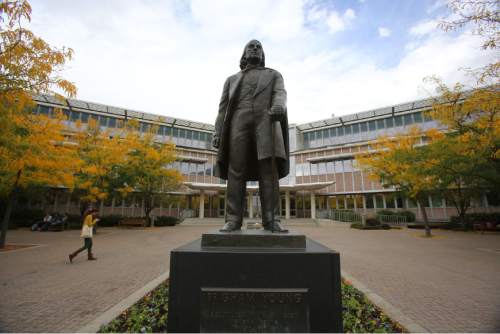This is an archived article that was published on sltrib.com in 2016, and information in the article may be outdated. It is provided only for personal research purposes and may not be reprinted.
Brigham Young University has relaxed the rules for students petitioning to remain on campus after shedding their Mormon faith.
And those students may now choose whether to allow the school, owned by The Church of Jesus Christ of Latter-day Saints, to talk about them with church leaders.
Mormon students generally have faced expulsion if they stop going to church. Students don't have to be Mormon to attend the private Provo school, but those who enroll as Latter-day Saints are expected to remain devout and must obtain endorsements from their faith leaders each year.
The university quietly updated its rulebook in November, removing language saying students could apply for exceptions to the ecclesiastical endorsement requirement only in "unusual circumstances." Students who do apply still must convince the dean that they abide by the school's Honor Code, but they may instead provide a "compelling" reason for deserving an exception — a seeming softening of the "extenuating circumstances" required in the old version.
And a student applying for the exemption now may decline to sign a release giving the school permission to speak with his or her bishop — a lay Mormon congregation leader who grants or denies ecclesiastical endorsements and counsels church members.
Previously, all students seeking an exemption were required to sign the release, and the dean of students would talk to their current and former bishops in weighing requests for exceptions to the endorsement. Now the dean of students may not discuss "confidential matters" with bishops unless a student signs.
"We made this adjustment because we thought it was fair," Brigham Young University spokeswoman Carri Jenkins said in an email.
Jenkins says the changes are nominal updates to a longstanding process.
"What we are saying is that students can submit a petition that will be handled on a case-by-case basis," Jenkins said.
A separate change in March 2015 allows for ex-Mormons or others without faith endorsements to apply to the school through a similar exception application.
The university prefers admitting active members of the church, its website says, but will not unlawfully discriminate against qualified applicants.
The changes are good news to FreeBYU, a group of alumni that has called for the school to allow Mormons who leave the faith to finish their BYU coursework if they pay the extra tuition required of non-LDS students. Between 1 percent and 1.5 percent of the school's 32,000 students are not members of the church and pay double what a Mormon student does — $10,600, as opposed to $5,300, in the 2015-2016 school year — on the basis that LDS families help support the faith's flagship school through their tithing.
"It's a small step," Brad Levin, FreeBYU spokesman, said of the changes, "but it's a definite one."
Levin, who graduated in 2011 with dual degrees in law and public administration, isn't wholly satisfied. The school's Honor Code still forbids students from resigning from the church, he notes. And it's unclear which, if any, standards the dean of students considers when approving or rejecting exemptions.
"It doesn't give a whole lot of comfort to the student" asking to stay, Levin said.
The school stresses that the rule applies to students who leave the LDS Church and not students who struggle with faith issues for a short time. The school works individually with students questioning their faith.
The policy tweaks came a month after Levin's group made a formal complaint to the American Bar Association (ABA), which accredits BYU's law school. BYU violates federal nondiscrimination law, Levin's group said in the complaint, and threatens intellectual freedom by expelling students who break the Honor Code by leaving the Mormon faith or living in same-sex relationships.
The bar association ceased its investigation into BYU in July after reviewing Levin's complaint and BYU's response.
Administrators had discussed and approved the tweaks before the bar group asked BYU to respond to the complaint, Jenkins said, adding that the school's approval process takes longer than a few weeks.
"We appreciated the fact that the ABA has rejected the complaint and closed the matter," Jenkins said. An ABA spokeswoman on Thursday said she had no comment.
FreeBYU made a similar pitch in March 2015 to the regional accreditor that reviews colleges and universities for the federal government, but the push was unsuccessful. In October, however, one speaker at a religious-liberty conference hosted by BYU canceled his talk in protest of the policy.
Twitter: @anniebknox



